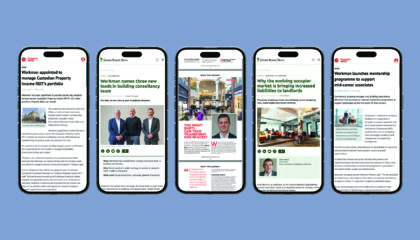In the latest on-road trials, Solihull Council’s state-of-the-art self-driving shuttle ferries passengers around Workman-managed Birmingham Business Park.
This most recent deployment forms part of a wider Council-led project. The aim is to test how CAVs can be safely integrated into the borough’s transport network.
Solihull is already playing a leading role in the development and deployment of CAV technology. In 2021, Solihull Council became the first local authority in the country to purchase its own electric and fully autonomous shuttle. The Greater Birmingham & Solihull Local Enterprise Partnership (GBSLEP) provided a grant for this purpose. Subsequently, successful passenger trials have taken place at Birmingham Airport and the NEC. This is also where the shuttle was also used in the Commonwealth Games Queen’s Baton Relay. Building on the success of these deployments, this latest trial will see the shuttle take to Solihull’s roads once again. This time, it will be transporting passengers along a pre-mapped loop of Birmingham Business Park while again interacting with other road users.
Designed and manufactured by Coventry’s Aurrigo, the futuristic looking Auto-Shuttle can carry up to ten passengers and uses a suite of sensors, including LiDAR, to understand its surroundings and move around safely. For the purposes of testing, the shuttle will be limited to a top speed of 20mph. In line with current legislation, a safety operator will be on-board at all times, and will be able to take control of the shuttle at any point if required.
Embracing the Future: Self-Driving Shuttle Trials at Birmingham Business Park
Business park employees and members of the public, have the opportunity to participate in the passenger trials of the UK’s first fully self-driving shuttles. The CAV will be running at Birmingham Business Park until the end of March. Visitors to the business park can book their ride.
These trials are providing Solihull Council and its partners with real-world test cases and data. The purpose of this is to gain a better understanding of the potential uses of this technology in the future. Furthermore, last month saw the announcement of larger scale plans for the Multi-Area Connected Automated Mobility (MACAM) project. Conigital, leading a regional consortium, will establish a permanent commercial route between Birmingham International rail station and Birmingham Business Park. The route will utilise a new fleet of self-driving vehicles. They will use the current trials at Birmingham Business Park as an important pathfinder project. This is ahead of this more ambitious project.
Councillor Ian Courts, Leader of Solihull Council, said:
“CAV technology has the potential to revolutionise the way we get around our towns, cities and rural areas and, Solihull is playing an increasingly important role in this emerging sector. We’ve already carried out a series of successful pathfinder trials here in Solihull. They demonstrate the possibility of safely and practically integrating autonomous vehicles into our future transport infrastructure.”
“The results of this trial will provide further knowledge and experience of self-driving vehicles in a real-world environment, helping to inform our future mobility services and highway infrastructure design across Solihull and the wider region. The CAV technology presents exciting opportunities for enhancing future transport and connectivity. The borough and the wider West Midlands region experience significant economic growth potential. This growth benefits our local research and advanced manufacturing sector.”
Lori Henebury, Workman’s Marketing, Community & Business Development Manager at Birmingham Business Park said:
“Birmingham Business Park already lies at the heart of one of the best-connected destinations in the UK and Europe. Operating in a busy, but controlled environment, we hope these latest trials will help to provide even more real-world operating experience which can be used to further improve efficiency and safety for passengers. We are excited to collaborate with Solihull Council, gaining valuable insights to enhance site access, transport links and contribute to our net-zero carbon ambitions.”



